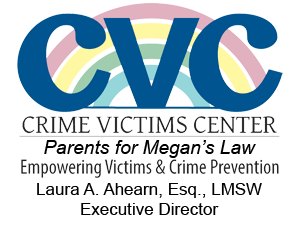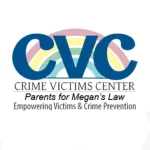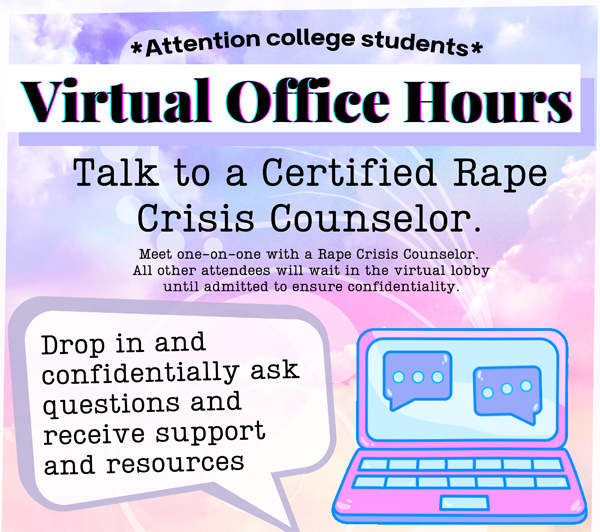For College Students
Articles
Suffolk County Community College Western Student Press article detailing the events of the 2022 SCCC Take Back the Night which took place on March 31, 2022. Written by Amanda Jesser, Prevention Education Program Manager; Elizabeth Dysart, Prevention Educator for Colleges and Universities; and Jessica St. Germaine, Staff Attorney of the Crime Victims Center and Take Back the Night Coalition members.
Click here to view
Videos
“PTSD is a one-woman show that uses humor to traverse the complex and frightening terrain of sexual violence on college campuses. Using a silent clown narrator to break the silence around personal and community trauma, playwright/performer Antonia Lassar tells the story of a campus sexual assault through the voices of a professor, Title IX coordinator, and a perpetrator” -Hannah Hodson, Autostraddle
Original Video
Whether it's murder or sexual assault, it's not the victim's fault.
Original Video
Beyond Physical Abuse: A Conversation on Domestic Violence - On December 1st, 2021 was a virtual panel that Crime Victims Center staff were invited to participate in as well as help plan. This was an initiative as part of the Suffolk County Community College Take Back the Night Coalition of which the Crime Victims Center is an active partner. The panel discussion helped to illustrate the various ways domestic violence or relationship violence can manifest beyond physical abuse. The panel included a discussion on economic and financial abuse, emotional and psychological abuse, as well as cyber abuse. During the panel we were able to speak about the various resources available for victims/survivors as well as ways to support a victim/survivor.
CNN - Terrifying being a woman after dark: Women around the world speak up on gender-based violence
After incidents of gender-based violence, the onus is usually put on women to change their behaviors to stay safe. The Global Brief with Bianca Nobilo conducted a social media call to ask women about their experiences. We received responses from Kenya to the Netherlands to Sri Lanka to the US, with the refrain eerily similar. Their responses show just how focused the conversation is towards women, rather than the perpetrator.
Take Back the Night at Suffolk County Community College
Original Video
Coercion, Consent and Sexual Violence | Dr. Felicia Kimbrough | TEDxSIUC (8:17)
Dr. Felicia Kimbrough, a Nurse Practitioner in an Illinois Health Care Center, speaks of the lack of reoccurring education about consent and sexual violence in America. There is a trend of adults and parents refusing to speak about these topics with their children, despite the fact that technology has given children increased access to pornography. This Ted Talk educates listeners about what consent is, and how coercing someone into sexual activities is sexual violence. This talk encourages students to engage in discussions about sexual violence throughout their lives in order to promote a cultural change.
Original Video
What If Bears Killed One In Five People?
Guys, this angry, hungry bear in our house is a big problem.
You wouldn't put up with that. So don't put up with this. 1 in 5 women will be sexually assaulted by the time they finish college. Do something about it. Take the pledge at itsonus.org
Original Video
WNYC News - New York State Releases Semester of Campus Assault Data
Consent 101
Four videos discussing topics pertaining to consent, including how to know if someone wants to have sex with you, how to tell when someone definitely wants to have sex, how to tell when someone isn’t quite sure if they want to have sex, and how to handle a situation when someone doesn’t want to have sex.
Intervene
Produced by the Skorton Center for Health Initiatives, a unit within Cornell Health at Cornell University, in collaboration with the Cornell Interactive Theater Ensemble, Intervene uses brief scenarios to demonstrate ways in which student bystanders can successfully intervene in problematic situations. Seven different situations are addressed, including sexual assault, sexual harassment, intimate partner violence (emotional abuse), hazing, an alcohol emergency, emotional distress, and bias. The video is intended to be used with students who already have some exposure to the college social environment, and is not intended to be used during new student orientation. A facilitator discussion guide and the results of a randomized control trial evaluation are also provided on the program web site.
Tea Consent (Clean)
Copyright ©2015 Emmeline May and Blue Seat Studios
Original Video
Resources
Going to College: What Families Need to Know About Sexual Assault and Safety on Campus
A document created by the National Sexual Violence Resource Center that offers guidance to help parents address key topics relating to sexual assault and safety before their child leaves for college. Teaching young adults about this prevalent public health issue will better prepare them to deal with this issue in an informed way.
Facts Everyone should know about Intimate Partner Violence, Sexual Violence & Stalking
A document including facts and statistics Intimate Partner Violence, Sexual Violence & Stalking provided by The National Intimate Partner and Sexual Violence Survey.
Truth about False Accusations Visualization
A graphic depicting the truth about the number of individuals who are falsely accused of rape.
How do Domestic Violence and Sexual Assault Intersect?
A document provided by the National Coalition Against Domestic Violence explaining how do Domestic Violence and Sexual Assault Intersect and how you can help.
What is Stalking?
A document provided by the National Coalition Against Domestic Violence covering facts about stalking and what you can do to help.
Good Faith Reporting by Bystanders
An explanation of Good Faith Reporting by Bystanders and how it positively impacts students on campus.
Students’ Bill of Rights
The rights that are held by all students in accordance with “Enough is Enough” legislation.
A Plain Language Explanation of Distinctions between the New York State Penal Law and the College Disciplinary Processes
A simplified explanation of the distinctions between the New York State Penal Law and the College Disciplinary Processes.



 Virtual Office Hours are
Virtual Office Hours are